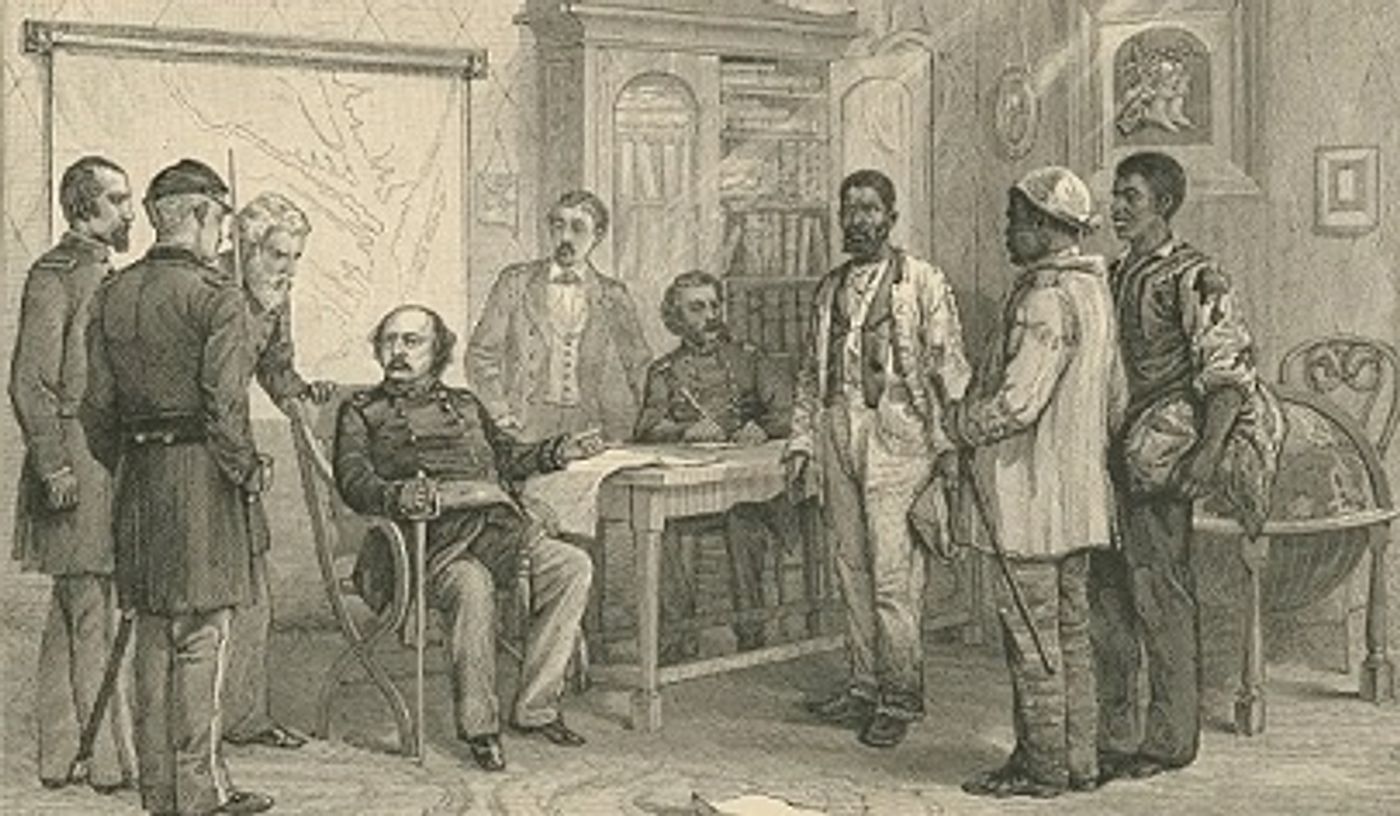Review: BEN BUTLER At Don Bluth Front Row Theatre
The production, directed by Lee Cooley, runs through July 8th at Don Bluth Front Row Theatre in Scottsdale, AZ.

The pages of history are littered with juicy footnotes that require some inquisitive scholar or artist to squeeze them out and expose their relevance to modern times. A pivotal episode in the march to Emancipation and the role of Major-General Benjamin Franklin Butler, one of Abraham Lincoln's premier civilian generals, in turning the tide, is one such footnote, unearthed and recreated in Richard Strand’s compelling history play, BEN BUTLER, now in-the-round through July 8th at Don Bluth Front Row Theatre in Scottsdale.
One of the seminal moments in the movement to end slavery occurred in the early stages of the Civil War, two years before the Emancipation Proclamation. The First Confiscation Act of 1861, signed by President Lincoln on August 6th, 1861, declared that all property, including slaves, “used or employed, in aiding, abetting, or promoting…insurrection or resistance to the laws” of the United States “to be lawful subject of prize and capture wherever found; and it shall be the duty of the President of the United States to cause the same to be seized, confiscated, and condemned.” The Act effectively stripped slave owners of their rights to ownership.
History records that the impetus and inspiration for this Act belongs to Butler, the Union commander of Fortress Monroe in Virginia.
In May of ‘61, three slaves ~ Frank Baker, Shepard Mallory, and James Townsend ~ sought and secured refuge at the garrison. When an agent for Colonel Charles K. Mallory, the owner of the slaves, demanded their return as mandated by the Fugitive Slave Act of 1850, Butler refused on the grounds that, because the Confederacy had used the slaves to support their war effort, they were, in effect, the “contraband of war” and, therefore, the property of the United States government. Butler’s position was subsequently known as the “Fort Monroe Doctrine” and the model for other Union commanders.

BEN BUTLER, playwright Richard Strand’s fictionalized account of the event, dives into the two days during which the General must decide wherein lies his moral obligation. Within a mere two weeks after his promotion to the rank of major-general and given command of the Department of Eastern Virginia, headquartered at Fort Monroe, Butler (Keath Hall) is compelled to deal with an utterly inconvenient challenge. Shepard Mallory (Justin Hosten), a runaway slave, has arrived at the encampment. He insists on a face-to-face with the commander, and, when granted, demands, in no uncertain terms, sanctuary.
Demanding is the last thing anyone should do with the irascible Butler. The general has little patience for much of anything as exemplified in the play’s opening exchange with his aide, Lieutenant Kelly (Leonidas Karandreas), who has announced the slave’s arrival and his demand to meet Butler.
BUTLER: Does he want sanctuary in this fort?
KELLY: Well, yes, but…
BUTLER: Then it’s not complicated at all. I can’t grant him that. It’s explicitly forbidden for us to offer sanctuary to runaway slaves. This issue has been decided already. And it has been decided by that rare group of men who are allowed to make demands on me. By the president and his cabinet, by every general who outranks me, and, by the way, my wife happens to agree with them. I don’t see how I can go against that.
It is a telling scene that sets the tone of the play and the dimensions of the characters with whom Shepard must contend. Butler is an immovable object whose discipline and conscience will be upset by this annoyance. Kelly, a recent West Point graduate, is a racist whose bias will be tempered ultimately by an ability to discern right from wrong.
When the slaveowner’s agent, Major John B. Cary (Tom Endicott) arrives to take possession of Mallory, Butler’s patience is put to the test in a tempestuous battle of temperaments and wits. Cary slowly removes his artillery gauntlets, finger by finger, fully expecting compliance with the Fugitive Slave Act. His Southern charm begins to wilt before Butler’s condescending eyes and he explodes in stuttering and stumbling disbelief as Butler toys with him and finally, to Cary’s chagrin, denies this latest demand.
From lights up, Hall has immediate physical command of the stage. He excels in accentuating the nuances of Butler’s moods with a host of revealing expressions ~ furrowed brows, grunts of exasperation, and periodic displays of shrewdness. The force of Hall’s performance guarantees that every exchange with the other characters will result in palpable chemistry.
If there’s a Laurel to Butler’s hardy disposition, it is Lt. Kelly, whose demeanor as an obedient but perceptive subordinate is perfectly captured by Karandreas. This young actor is the comedic jewel of the play.
Justin Hosten does admirably well in portraying Shepard Mallory’s intellect, tenacity, and desperation as a marked contrast to Butler’s stubbornness and tempestuousness. He embodies the fierce determination and intelligence of a man who knows the odds and yet gambles that Butler’s humanity will outweigh his obedience to the law.
Tom Endicott’s performance as the Confederate agent is another bright light of the show. Endowed with a perfect Southern accent and a delightful propensity for feistiness, his battle of words and wits with Butler kicks the second act of the play into high gear.
The exchanges between the slave and the general may seem rather unlikely, but this is a fiction with an intention, a parable of sorts ~ to reveal, with a blend of gravitas and satirical wit, the moral dilemma that comes when weighing what is legal against what is fair and morally right. Shepard speaks truth to power. Butler resists but not without sparks of conscience and pragmatism. The result is that the scales of justice tip toward freedom.
A tip of the hat to Cheryl Schaar for enhancing the setting with walls filled with authentic artifacts, photographs, and armaments of the Civil War period.
BEN BUTLER is a compelling piece of work, heightened by the astute direction of Lee Cooley, whose strength lies in selecting a fine cast and enabling them to breathe humanity and nuance into their roles. The innovation here is that he has also maximized the in-the-round to great effect, ensuring that the pacing and blocking remain brisk and engaging. The bottom line is that Cooley and his cast have rendered a thoroughly enjoyable and thought-provoking theatrical experience.
BEN BUTLER runs through July 8th at Don Bluth Front Row Theatre ~ 8989 E. Vía Linda #118, Scottsdale, AZ ~ 480-314-0841 ~ https://www.donbluthfrontrowtheatre.com/.
Graphic/Photo credit to Don Bluth Front Row Theatre
Image Source: New York Public Library Digital Collections: Illustration depicting the escaped slaves with General Benjamin Butler (seated at the table with the sword in his hand.
Reader Reviews

Videos

